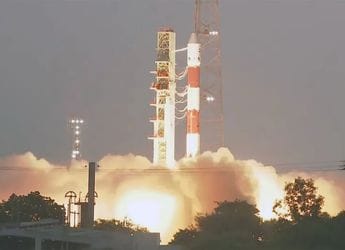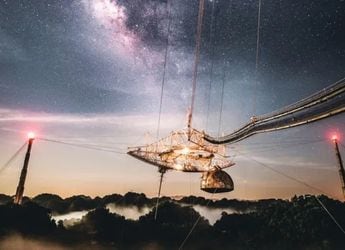- Home
- Science
- Science News
- NASA Commercial Crew Program for Space Station Faces Delays, Report Says
NASA Commercial Crew Program for Space Station Faces Delays, Report Says
SpaceX spacecrafts the Dragon (L) and the DragonRider sit on display at a SpaceX facility
Plans to launch the first NASA astronauts since 2011 to the International Space Station from the United States look set to be delayed due to incomplete safety measures and accountability holes in the agency's commercial crew program, according to a federal report released on Wednesday.
SpaceX and Boeing Co are the two main contractors selected under the National Aeronautics and Space Administration's commercial crew program to send US astronauts to space as soon as 2019, using their Dragon and Starliner spacecraft respectively.
But the report from the Government Accountability Office said the issues could cause delays in the launch of the first crewed mission from US soil by a private company and could result in a nine-month gap in which no US astronauts inhabit the ISS.
"Boeing and SpaceX continue to make progress developing their crew transportation systems, but both contractors have further delayed the certification milestone to early 2019," the report said.
"Without a viable contingency option for ensuring uninterrupted access to the ISS in the event of further commercial crew delays, we concluded that NASA was at risk of not being able to maximize the return on its multibillion dollar investment in the space station," it added.
Boeing said it was aiming for test flights this year.
"Boeing is working with NASA to ensure that the CST-100 Starliner flies at the earliest time it is safe to do so," Boeing senior spokesman Jerry Drelling told Reuters in an email.
Officials with SpaceX, formally known as Space Exploration Technologies, and NASA could not immediately be reached to comment.
In 2014, SpaceX and Boeing respectively received $2.6 billion and $4.2 billion (roughly Rs. 17,800 crores and Rs. 28,800 crores) contracts to build crew transportation systems under the commercial crew program, NASA's flagship campaign to use the private sector for ISS missions.
In the report, NASA said it was working closely with its commercial partners to resolve the issues and was developing contingency plans in case of further delays.
Before SpaceX and Boeing can launch the astronauts they must demonstrate their crew systems are safe for human spaceflight, according to NASA.
The GAO said it is tracking potential safety risks on the private companies' crew capsules, including a Boeing Starliner abort system meant to eject the capsule from a hazardous rocket explosion, and a since-upgraded fuel valve on SpaceX's Falcon rocket that triggered a costly 2016 launchpad explosion.
Since 2011, NASA has bought seats on the Russian Soyuz spacecraft months in advance to send US astronauts to the space station from launchpads in Kazakhstan. US launches before 2011 were handled by NASA.
© Thomson Reuters 2018
Catch the latest from the Consumer Electronics Show on Gadgets 360, at our CES 2026 hub.
Related Stories
- Samsung Galaxy Unpacked 2025
- ChatGPT
- Redmi Note 14 Pro+
- iPhone 16
- Apple Vision Pro
- Oneplus 12
- OnePlus Nord CE 3 Lite 5G
- iPhone 13
- Xiaomi 14 Pro
- Oppo Find N3
- Tecno Spark Go (2023)
- Realme V30
- Best Phones Under 25000
- Samsung Galaxy S24 Series
- Cryptocurrency
- iQoo 12
- Samsung Galaxy S24 Ultra
- Giottus
- Samsung Galaxy Z Flip 5
- Apple 'Scary Fast'
- Housefull 5
- GoPro Hero 12 Black Review
- Invincible Season 2
- JioGlass
- HD Ready TV
- Laptop Under 50000
- Smartwatch Under 10000
- Latest Mobile Phones
- Compare Phones
- Samsung Galaxy A07 5G
- Vivo Y500i
- OnePlus Turbo 6V
- OnePlus Turbo 6
- Itel Zeno 20 Max
- OPPO Reno 15 Pro Mini 5G
- Poco M8 Pro 5G
- Motorola Signature
- Lenovo Yoga Slim 7x (2025)
- Lenovo Yoga Slim 7a
- Realme Pad 3
- OPPO Pad Air 5
- Garmin Quatix 8 Pro
- NoiseFit Pro 6R
- Acerpure Nitro Z Series 100-inch QLED TV
- Samsung 43 Inch LED Ultra HD (4K) Smart TV (UA43UE81AFULXL)
- Asus ROG Ally
- Nintendo Switch Lite
- Haier 1.6 Ton 5 Star Inverter Split AC (HSU19G-MZAID5BN-INV)
- Haier 1.6 Ton 5 Star Inverter Split AC (HSU19G-MZAIM5BN-INV)

















